His House 9th Street Treatment Center
239 West 9th Street
Upland, CA 91786
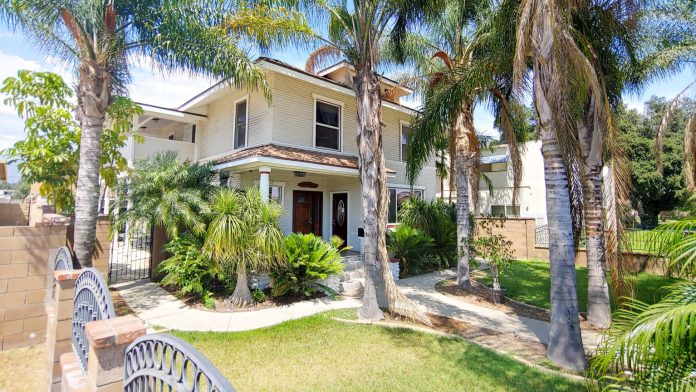
About His House 9th Street Treatment Center
His House 9th Street Treatment Center is an alcohol and drug rehab center in Upland, California that provides gender-specific addiction treatment for men. They also offer mental health and behavioral health treatment. Their levels of care include residential treatment, outpatient treatment, and sober living homes. His House 9th Street Treatment Center provides personalized programming that caters to the unique needs of each client.
His House 9th Street Treatment Center offers treatment that is focused on the whole person. While in treatment, clients engage in yoga, nutritional classes, fitness, and mental health counseling. Areas of focus include relapse prevention, identifying and overcoming triggers, creating a long-term recovery plan, discharge planning, anger management, stress management, and learning basic life skills necessary to live a life of sobriety. Staff can also provide medication management. His House 9th Street Treatment Center accepts most insurance plans and is accredited by The Joint Commission.
Amenities
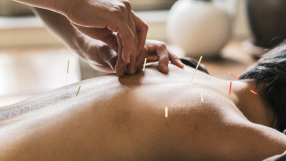
Acupuncture Room
Acupuncture is one of the most popular luxurious and alternative therapies offered by rehabs. An acupuncture r...oom provides benefits like pain reduction, improved sleep, a healthy immune system, and a decrease in anxiety.
Art Therapy
Art and music are mediums that connect with our feelings, making them a great recovery tool during addiction t...reatment. Studies show that combining art/music and drug rehab can have a greater therapeutic impact than drug rehab alone, as you’re able to access parts of your brain and body that you may not have access to during traditional talk therapy. Benefits of art/music therapy include lowering stress and anxiety, promoting healthy neurochemicals, and providing stress relief.
Day School
Addiction treatment programs provide an opportunity to get your life back on track with access to school class...es or college courses. Whether you want to finish your GED or go back to school to learn a new trade, facilities often enlist tutors and teachers who are certified or licensed by the state to oversee self-study or distance-learning education.
Adventure Therapy
Hiking is a great way to relieve stress, get perspective, navigate challenges, connect with nature, and improv...e your health - all essential components of sustaining long-term recovery. Studies also show that the body releases endorphins during physical activities like hiking. These endorphins improve mood and act as a natural pain reliever.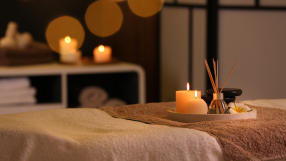
Massage Room
The massage room offers a wealth of benefits as part of an overall evidence-based drug and alcohol recovery pr...ogram. Massage therapy boosts blood flow and flushes lactic acid from the muscles, and the vascular benefits last several days after the massage.
Meditation Room
Yoga and meditation are great activities to support your recovery process during alcohol or drug rehab. These ...therapies have been around for centuries, and they are an effective way to improve well-being. Combining addiction treatment, yoga, and meditation can reduce cravings, improve sleep, relieve anxiety and depression, provide stress relief, promote relaxation, support emotional healing, and improve energy levels.
Mountain Views
Rehabs that offer mountain views provide beautiful spaces for clients to explore, de-stress, and take part in ...outdoor or wilderness therapy programs. The mountain surroundings can be a great help to the recovery process, as sobriety may be better achieved while surrounded by a serene setting in nature.
Music Room
Music can be extremely therapeutic, serving as a valuable healing tool and an integrative feature of a holisti...c treatment plan. A music room offers a large number of outlets, including singing, playing musical instruments, and listening to music.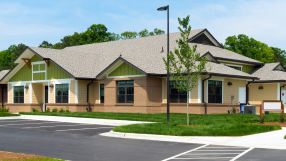
Private Rehab
Private drug rehab provides a comfortable, secure environment that allows you to focus on doing the work to ge...t your life back on track. Benefits include a higher staff-to-client ratio, increased one-on-one time with therapists and healthcare providers, private rooms for clients, and customized forms of therapy.
Residential Setting
Residential drug rehab provides the comforts of home with the therapeutic support needed to successfully recov...er. Benefits of an inpatient program include increased safety, a higher success rate, and the time and distance given to focus on recovery. Residential drug rehabs are often the preferred method of treatment, as they can be tailored to meet specific needs, offer focused therapeutic care, and provide the necessary tools to sustain recovery.
Swimming Pool
Swimming increases blood flow to the body and brain, boosts white blood cells, and improves muscle strength, l...ung capacity, and overall stamina. Drug rehabs with a swimming pool offer physical and mental benefits to complement the recovery process.
Yoga Studio
Treatment centers with a yoga studio offer a special form of holistic therapy during the recovery process. Yog...a boosts mindfulness, a sense of calm, and healthy reflection during drug rehab via breathing exercises, stretching, and a progression of specific postures.Addiction Treatment Programs
Adult Program
An adult program in California uses various therapeutic methods to treat a person who is dependent on an addictive substance. Individuals aged 18 and older are eligible for treatment, which focuses on breaking the cycle of addiction and learning how to maintain sober living.Cognitive Behavioral Therapy (CBT)
When a person is struggling with addiction, their actions and emotions may not be rational. Cognitive behavioral therapy in California helps individuals understand better why they feel and act certain ways and how those emotions and actions can lead to substance abuse.LGBTQ Friendly Rehab
The incidence of substance abuse and addiction is higher among the LBGTQ community. That’s why LBGTQ-friendly rehab in California is available, to offer specialized treatment that addresses the unique needs of individuals in this demographic.Men's Rehab
Gender-specific addiction treatment programs may be more effective in treating men because they focus on unique needs of males. Men’s rehab in California is designed to help men process emotions and cope with stress in a judgment-free environment.Senior Drug & Alcohol Rehab
Seniors face unique challenges that may contribute to substance use disorder and co-occurring disorders. Elderly rehab in California is designed to address these challenges to provide relevant and safe treatment for seniors.Teen & Adolescent Program
Typically, a young adult program in California can guide individuals from detox, through initial treatment, and extends to aftercare. Treatment gives young adults what they need to reset their lives and move to the next stage of life free from addiction.Levels of Care
Detox & MAT
When you enter drug rehab in California, detox is the first step towards becoming drug-free. The detox process... includes 24/7 monitoring and medical care and may include the use of medications to ease withdrawal symptoms.Inpatient Rehab
Unlike outpatient drug rehab, clients receiving inpatient rehab in California reside at the facility for the d...uration of the program. The length of stay may range from two weeks to 18 months or more, depending on the client's needs and the program’s design.Outpatient Rehab
When you choose outpatient rehab in California, you will meet with a counselor and attend support group meetin...gs. The focus will be on restructuring attitudes and thoughts to reduce cravings and develop skills to prevent relapse. The length of time in outpatient rehab varies by individual, based on their recovery needs.Dual Diagnosis & Mental Health
When you have a co-occurring disorder, it is essential to treat both your addiction and the mental health diso...rder. California dual diagnosis treatment provides this type of multidisciplinary approach, for improved recovery outcomes.Drug & Alcohol Intervention
Intervention services in California provide the support you need to encourage a loved one to make wise recover...y decisions. Professionals will help you work with your loved one to develop an intervention plan and get him or her started on their recovery journey.Sober Living
California sober living has been shown to reduce relapse and improve recovery. These programs offer highly-str...uctured living environments for those who desire to remain sober. House rules usually include abstinence from substances, participation in 12-step meetings, and contribution to household responsibilities.Accreditations

LegitScript Certified

Joint Commission

State License #:
360075BPInsurance
 Private Insurance
Private Insurance
As a California resident with private rehab insurance, you can use your coverage to help pay for alcohol and d...rug addiction treatment. You may be asked to pay some costs like a co-payment or co-insurance. Check with your insurer for more information.
 Self-Pay Options
Self-Pay Options
There are a number of self-pay options available for alcohol and drug rehab in California. If you can’t affo...rd to write a check for the full cost of inpatient or outpatient treatment, personal and medical loans offer alternate ways of financing.
 Sliding Scale Payment
Sliding Scale Payment
If you’re ready to enter a drug rehab program in California, but you cannot afford to pay the full amount, a... sliding scale payment plan may be the solution for you. This option asks you to make payments in an amount you can reasonably afford on a consistent basis. To qualify for this discount, you must complete an application and provide supporting financial documentation.Contact His House 9th Street Treatment Center

Location Details
Other Nearby Facilities

1856 Deodora St
Simi Valley, CA 93065
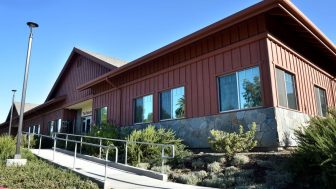
1722 South Lewis Road
Camarillo, CA 93012
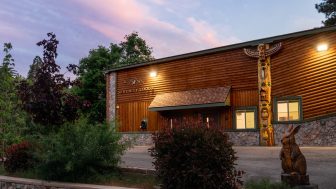
985 Meadow Brook Road
Lake Arrowhead, CA 92326
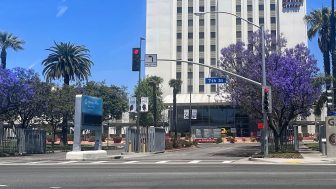
5901 East 7th Street
Long Beach, CA 90822